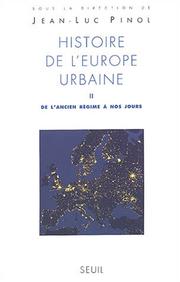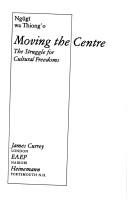| Listing 1 - 10 of 45 | << page >> |
Sort by
|
Book
ISBN: 0333608593 0333608585 9780333608593 Year: 1994 Publisher: London Macmillan
Abstract | Keywords | Export | Availability | Bookmark
 Loading...
Loading...Choose an application
- Reference Manager
- EndNote
- RefWorks (Direct export to RefWorks)
Europe --- Great Britain --- Grande-Bretagne --- Relations --- Civilization --- European influences --- Civilisation --- influence europeenne --- Europe - Relations - Great Britain.
Book
ISBN: 9789042033573 Year: 2011 Volume: 134 Publisher: Amsterdam New York : Rodopi,
Abstract | Keywords | Export | Availability | Bookmark
 Loading...
Loading...Choose an application
- Reference Manager
- EndNote
- RefWorks (Direct export to RefWorks)
Striding Both Worlds illuminates European influences in the fiction of Witi Ihimaera, Aotearoa New Zealand’s foremost Maori writer, in order to question the common interpretation of Maori writing as displaying a distinctive Maori world-view and literary style. Far from being discrete endogenous units, all cultures and literatures arise out of constant interaction, engagement, and even friction. Thus, Maori culture since the 1970s has been shaped by a long history of interaction with colonial British, Pakeha, and other postcolonial and indigenous cultures. Maori sovereignty and renaissance movements have harnessed the structures of European modernity, nation-building, and, more recently, Western global capitalism, transculturation, and diaspora – contexts which contest New Zealand bicultural identity, encouraging Maori to express their difference and self-sufficiency. Ihimaera’s fiction has been largely viewed as embodying the specific values of Maori renaissance and biculturalism. However, Ihimaera, in his techniques, modes, and themes, is indebted to a wider range of literary influences than national literary critique accounts for. In taking an international literary perspective, this book draws critical attention to little-known or disregarded aspects such as Ihimaera’s love of opera, the extravagance of his baroque lyricism, his exploration of fantasy, and his increasing interest in taking Maori into the global arena. In revealing a broad range of cultural and aesthetic influences and inter-references commonly seen as irrelevant to contemporary Maori literature, Striding Both Worlds argues for a hitherto frequently overlooked and undervalued depth and complexity to Ihimaera’s imaginary. The present study argues that an emphasis on difference tends to lose sight of fiction’s capacity to appreciate originality and individuality in the polyphony of its very form and function. In effect, literary negotiation of Maori sovereign space takes place in its forms rather than in its content: the uniqueness of Maori literature is found in the way it uses the common tools of literary fiction, including language, imagery, the text’s relationship to reality, and the function of characterization. By interpeting aspects of Ihimaera’s oeuvre for what they share with other literatures in English, Striding Both Worlds aims to present an additional, complementary approach to Maori, New Zealand, and postcolonial literary analysis.
Ihiamera (Witi), 1944 --- -Postcolonialisme --- Littérature néo-zélandaise --- Dans la littérature --- 20e siècle --- Influence européenne
Book
ISBN: 9783030407971 Year: 2020 Publisher: Cham : Springer International Publishing : Imprint: Palgrave Macmillan,
Abstract | Keywords | Export | Availability | Bookmark
 Loading...
Loading...Choose an application
- Reference Manager
- EndNote
- RefWorks (Direct export to RefWorks)
This book explores how to understand the international appeal of Danish television drama and Nordic Noir in the 2010s. Focusing on production and distribution as well as the series and their reception, the chapters analyse how this small nation production culture was suddenly regarded as an example of best practice in the international television industries, and how the distribution and branding of particular series – such as Forbrydelsen/The Killing, Borgen and Bron/The Bridge – led to dedicated audiences around the world. Discussing issues such as cultural proximity, transnationalism and glocalisation, the chapters investigate the complex interplays between the national and international in the television industries and the global lessons learned from the way in which screen ideas, production frameworks and public service content from Denmark suddenly managed to travel widely. The book builds on extensive empirical material and case studies conducted as part of the transnational research project ‘What Makes Danish Television Drama Travel?’.
Motion pictures and television. --- Motion picture --- Cinéma et télévision. --- Cinéma --- European influences. --- Influence européenne. --- Motion pictures
Book
ISBN: 9782717867190 2717867198 Year: 2015 Publisher: Paris : Economica,
Abstract | Keywords | Export | Availability | Bookmark
 Loading...
Loading...Choose an application
- Reference Manager
- EndNote
- RefWorks (Direct export to RefWorks)
Cet ouvrage traite de la projection coloniale dans ses dimensions juridiques. Il décrit une mondialisation par la colonisation – dépassant l’histoire coloniale de la France – au cours de laquelle les choix de droits par tous les États se sont faits sur des territoires disputés, longtemps insuffisamment dessinés géographiquement. D’où des « colonies » aux habillages juridiques divers, épousant – en les transformant – les débats des siècles successifs et confrontées aux défis permanents de l’international. Cette Introduction insiste sur le recours au droit utile à l’entreprise coloniale et aux rapprochements opérés dans des sociétés complexes ainsi que sur l’équilibre trouvé entre droits « natifs » originaux, droits indigènes et droits d’importation. Il interroge l’élaboration d’une science du « droit colonial » encore en déficit d’autonomie mais qui confirme l’existence de « souverainetés en morceaux »
Colonies --- Droit --- Histoire --- Histoire. --- Law --- Colonization --- Imperialism --- Colonie --- --Droit --- --Histoire --- --Influence européenne --- --Europe --- --Colonisation --- --Impérialisme --- --Law and legislation --- European influences --- History --- Europe --- Colonies - Law and legislation --- Law - European influences --- Colonization - History --- Imperialism - History --- Influence européenne --- Colonisation --- Impérialisme --- Europe - Colonies - History
Book
ISBN: 9782845165359 Year: 2012 Volume: *43
Abstract | Keywords | Export | Availability | Bookmark
 Loading...
Loading...Choose an application
- Reference Manager
- EndNote
- RefWorks (Direct export to RefWorks)
Ces contributions interrogent la circulation des idées, des oeuvres et des formes littéraires de part et d'autre de l'Atlantique entre le XVIe et le XXe siècle. L'océan Atlantique est ici considéré comme le moteur d'une dynamique d'interaction culturelle qui a façonné l'espace lusophone.
Portuguese literature --- Littérature lusophone --- Brazil --- Brésil --- Civilization --- European influences --- Civilisation --- Influence européenne --- Littérature lusophone --- Brésil --- Influence européenne
Book
ISBN: 2915310874 2915310416 Year: 2008 Publisher: Éditions de l’IHEAL
Abstract | Keywords | Export | Availability | Bookmark
 Loading...
Loading...Choose an application
- Reference Manager
- EndNote
- RefWorks (Direct export to RefWorks)
Terre d’accueil de nombreux immigrés européens au Mexique et berceau d’un folklore local jaloux de sa richesse, Guadalajara voit se méler durant le Porfiriat (1877-1910) cultures européennes et mexicaine, voyageurs et tapatíos, revendication d’une culture régionale originale et regard sur l’Europe. À l’image du reste du pays, la capitale du Jalisco est ainsi confrontée à une européanisation des modes de vie, de consommation ou de divertissement qu’un regard superficiel pourrait résumer par la classique europhilie des élites porfiriennes. Or, une analyse détaillée du discours des élites jalisciences dans le journal satirique Juan Panadero montre que ce rapport à l’Europe est plus complexe qu’il n’y paraît. Tantôt critique, tantôt admiratif, et bien souvent ironique, cette publication se fait porte-parole d’une société pour qui le rapport à l’Europe, plus que synonyme de modernité, constitue le principal argument d’un rapport de force avec le pouvoir central et México. Le Juan Panadero renvoie alors l’image vivante d’une société qui se cherche, se contredit et se raconte, donnant à voir l’une des grandes contradictions du Mexique porfirien qui se heurte à de fortes résistances régionales dans le processus de mise en place du fédéralisme.
Regions & Countries - Americas --- History & Archaeology --- Mexico --- sciences sociales --- élite --- politique --- Européens --- Guadalajara --- presse satirique --- influence européenne --- immigrés
Book
ISBN: 9783039107322 Year: 2006 Publisher: Oxford Bern Bruxelles : Peter Lang,
Abstract | Keywords | Export | Availability | Bookmark
 Loading...
Loading...Choose an application
- Reference Manager
- EndNote
- RefWorks (Direct export to RefWorks)
The essays collected in this volume include a selection of those presented at a conference in the Universitat Rovira i Virgili, Tarragona, Spain, in 2002. They highlight the existence of a European network of women's writing which became a valuable source of consciousness-raising, not only for European women writers, but also for their readers. The main theme running through the essays is love: women loving against the odds and transcending all kinds of obstacles. Does love speak a common language or is it inevitably linked to social mores and individual experience? Does desire work in the same way? Do love and desire have the power to subvert dichotomous thinking and motivate real change? The texts studied in this volume are both fictional and factual, from plays and novels to diaries, letters and drama performances. The countries the essays travel through, and the languages they encounter, all contribute to forming a magic web of connections, solidarities and ideas that truly cross boundaries.
LITTERATURE ANGLAISE --- AMOUR DANS LA LITTERATURE --- LITTERATURE ANGLAISE --- FEMMES ET LITTERATURE --- FEMMES --- FEMMES ECRIVAINS --- INFLUENCE EUROPEENNE --- PAYS DE LANGUE ANGLAISE --- PAYS DE LANGUE ANGLAISE --- LITTERATURE ANGLAISE --- AMOUR DANS LA LITTERATURE --- LITTERATURE ANGLAISE --- FEMMES ET LITTERATURE --- FEMMES --- FEMMES ECRIVAINS --- HISTOIRE ET CRITIQUE --- INFLUENCE EUROPEENNE --- PAYS DE LANGUE ANGLAISE --- PAYS DE LANGUE ANGLAISE --- VIE INTELLECTUELLE

ISBN: 2020612933 2020376202 2020376253 9782020376204 9782020612937 9782020376259 Year: 2003 Volume: *63 Publisher: Paris Seuil
Abstract | Keywords | Export | Availability | Bookmark
 Loading...
Loading...Choose an application
- Reference Manager
- EndNote
- RefWorks (Direct export to RefWorks)
Environmental planning --- History of Europe --- Cities and towns --- City planning --- Urbanization --- Villes --- Urbanisme --- Urbanisation --- History --- Histoire --- History. --- Cities and towns - Europe - History. --- Urbanization - Europe - History. --- VILLES --- URBANISME --- SOCIOLOGIE URBAINE --- EUROPE --- HISTOIRE --- INFLUENCE EUROPEENNE

ISBN: 0852555318 085255530X 0435080792 Year: 1993 Publisher: London Currey
Abstract | Keywords | Export | Availability | Bookmark
 Loading...
Loading...Choose an application
- Reference Manager
- EndNote
- RefWorks (Direct export to RefWorks)
African literature --- anno 1900-1999 --- -African literature --- -Black literature (African) --- Authors, African --- European influences --- History and criticism --- European influences. --- History and criticism. --- -European influences --- Black literature (African) --- LITTERATURE AFRICAINE --- 20E SIECLE --- HISTOIRE ET CRITIQUE --- INFLUENCE EUROPEENNE
Book
ISBN: 2707121045 9782707121042 Year: 1992 Publisher: Paris La Découverte
Abstract | Keywords | Export | Availability | Bookmark
 Loading...
Loading...Choose an application
- Reference Manager
- EndNote
- RefWorks (Direct export to RefWorks)
Europe --- Latin America --- Amérique latine --- Relations --- Civilization --- European influences --- Civilisation --- Influence européenne --- Civilization. --- European influences. --- Amérique latine --- Influence européenne --- Latin America - Civilization - European influences --- Europe - Relations - Latin America --- Latin America - Civilization --- Latin America - Relations - Europe
| Listing 1 - 10 of 45 | << page >> |
Sort by
|

 Search
Search Feedback
Feedback About UniCat
About UniCat  Help
Help News
News